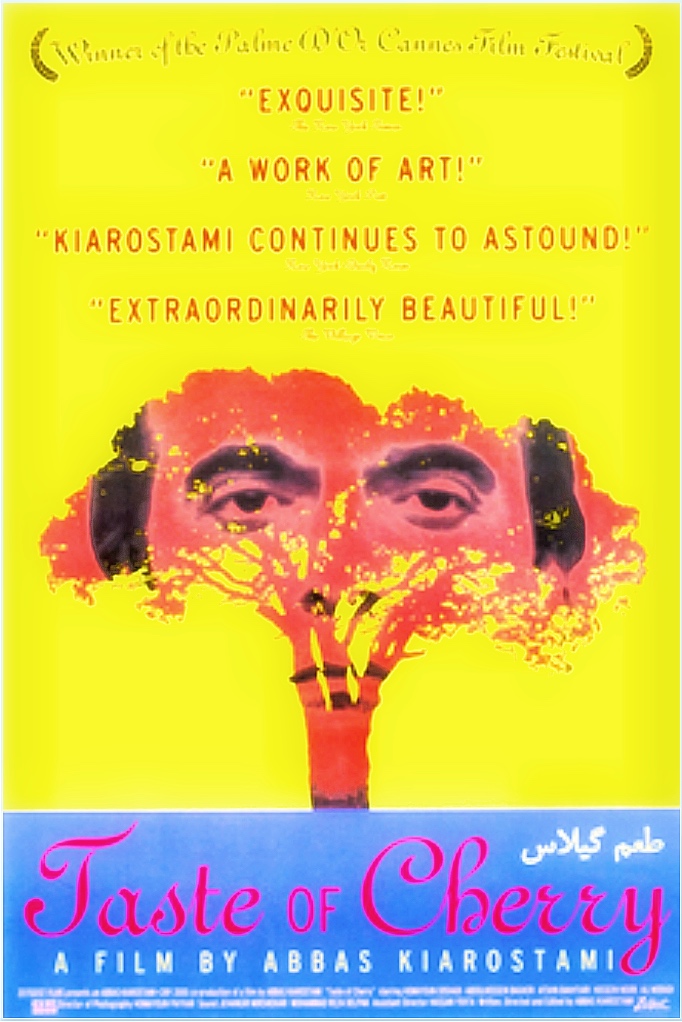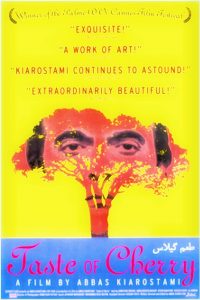
TASTE OF CHERRY
Existence. A burden. A burden difficult to carry. Each daylight brings a repetition of carrying the weight of everyday responsibilities, having their various kinds of sorrow. We drift sometimes in the same shallow water, not even having the time to ask ourselves if there is any meaning in this never-ending insanity. However maddening the rush around us is, it takes only to look at the mesmerizingly blue tint of the sky to have a fresh breath of enlivening beauty. Listening to the songs of the birds, feeling the wind the seagulls carry with their wings can put an everlasting smile on our faces, because they know, nature knows our need for solidarity and nature is always ready to support us. All we need to do is to open our eyes to nature and feel how it circulates in our veins.
“Taste of Cherry”, the 1997 film by marvelous, one of the most important directors of the world, Abbas Kiarostami, makes us think of the meaning of our existence again and again. It is a minimalist film, as nearly all his films are. Life is shown as it is present, simple at first look, but life-depth in every frame. The scenes do not change much, people talk, think, movement is very limited. The film wants you to join it with your thoughts, everything is so full of life itself. The film was awarded the Palme d’Or in Cannes Film Festival in 1997. Homayoun Ershadi acts as Mr. Badii, the main character.
We are human beings, the mysterious creatures living in this awesome planet we call our home, cherishing us even we do not feel it all the time. Let us cherish it, with all its sunrises, sunsets, joys and sorrows and feel alive.

Is it worth to go on carrying the burden? What does life offer us apart from unspeakable grief that we cannot avoid? We see a man driving through the suburbs of Tehran. It seems like that different parts of this ancient city is being built, new life is getting ready for people, the ongoing struggle can be seen everywhere. Through this life battle, we see this man trying to find someone to take care of his body after he commits suicide. His grave is ready as well, but he is worried about his body, wants it to be properly buried at the site he has chosen. He thought and decided to commit suicide with a clear mind, it is not a rush action. He worries about his body after his suicide, he wants it to be cared properly by a person he trusts. He meets a Kurdish soldier first. He is shocked at his request, wants to escape from his side as if death lurks there. He takes an Afghan seminarist on his vehicle, he tries to persuade him not to end his own life, telling him the religious comment. He never mentions the reason leading him to suicide. We see an Azeri taxidermist as the last person getting on his vehicle. He is very sad about his decision and he tells of the time he too wanted to end his life. When he was young and life brought a different problem each new day, he went to a mulberry tree to kill himself. When he looked around, tasted the fruit, saw the daylight, he felt as if the world tells him the secret of life as Jeanette Winterson says in his wonderful novel “Frankissstein”: “We are lucky, even the worst of us, because daylight comes.” We know for sure that we will die one day, not be able to see the daylight and all the beauties of the world, why hurry? As Kurt Vonnegut expresses in “The Sirens of Titan”, “…even a man without a friend in the whole universe could still find his home planet mysteriously, heartbreakingly beautiful.” We see tears in Mr. Bedii’s eyes, he says he cannot go on. The man promises to help him, but raises questions in his mind and we see he might change his mind.
The film raises questions on the issues of the meaning of life and death whatever the circumstances are. As we have this journey of the story we ask ourselves like Shakespeare in his Sonnet 53:
“What is your substance, whereof are you made, That millions of strange shadows on you tend?”
Rosa Luxemburg gives us the true meaning of life as she says in a letter from prison:
“To be a human being is the main thing above all else. And that means to be firm and clear and to be cheerful, yes, to be cheerful in spite of everything and anything, because howling is the business of the weak. To be a human being means to joyfully toss your entire life in the giant scales of fate if it must be so, and at the same time to rejoice in the brightness of every day and the beauty of every cloud.” We are human beings, the mysterious creatures living in this awesome planet we call our home, cherishing us even we do not feel it all the time. Let us cherish it, with all its sunrises, sunsets, joys and sorrows and feel alive. “Our burden is our freedom” as Sartre says.
